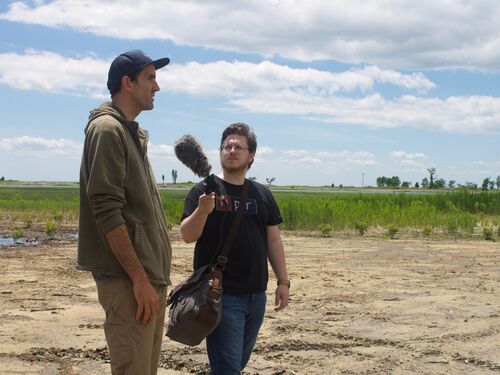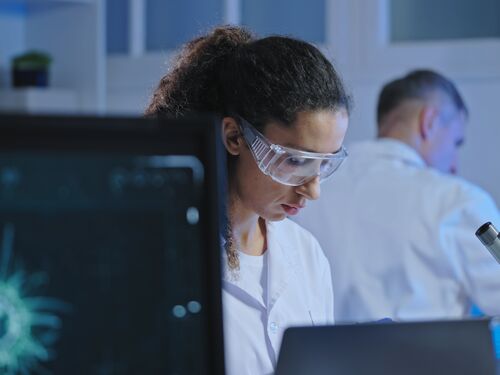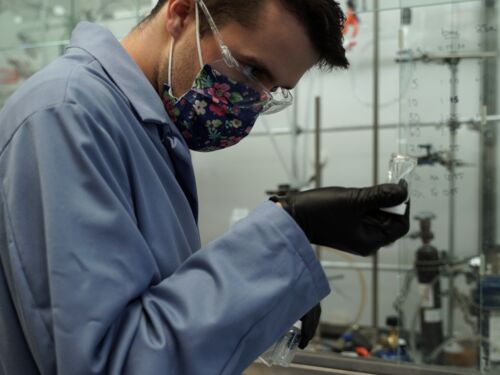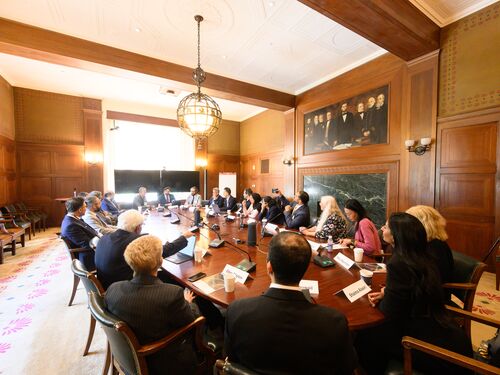U.S. Nobel Prize Laureates Receive Medals at NAS Ceremonies
Feature Story
By Molly Galvin
Last update December 9, 2021
The National Academy of Sciences this week hosted celebrations for the winners of 2021 Nobel Prizes who are based in the United States, joining in ceremonies and events being held around the world to celebrate laureates unable to travel to Stockholm this year because of the COVID-19 pandemic.
On Monday, Dec. 6, Nobel Prize medals and diplomas were presented to laureates on the East Coast — physics laureate Syukuro Manabe, chemistry laureate David W.C. MacMillan, and economic sciences laureate Joshua Angrist — at a ceremony held in the NAS building in Washington, D.C. And on Wednesday, Dec. 8, a parallel ceremony was held on the West Coast to honor physiology or medicine laureates David Julius and Ardem Patapoutian, and economic sciences laureates David Card and Guido W. Imbens, taking place at the National Academies’ Arnold and Mabel Beckman Center in Irvine, California.
NAS President Marcia McNutt said that it was quite an honor to host the ceremonies, noting that more than 200 Nobel laureates — including several of this year’s winners — are also Academy members.
“Science has repeatedly risen to the challenge in times of crisis,” said McNutt, remarking how researchers across disciplines have worked tirelessly to understand the origin and evolution of the virus, identify effective interventions, and produce vaccines and therapeutics. “But it’s important to recognize that none of these scientific accomplishments would have been available without a solid foundation of decades of investment in fundamental research. Following in the tradition of past laureates, the scientists we are honoring today had the conviction to follow their research to new and unexpected discoveries that few could have imagined.”
In challenging times, international cooperation and collaboration in research is more important than ever, said Maria Brogren, science and innovation counselor with the embassy of Sweden. “Many of today’s complex global problems call for cooperation … and it’s often not sufficient to look for answers within your own discipline, your own university, or even your own country.” The U.S. has a strong research community with excellent scientists, said Brogren: “However, many of the U.S. based laureates, including this year’s, were born outside the U.S. This openness and this ability to incorporate competence and ideas from the outside, to find new combinations of disciplines and methods, contributes to the strong record that the U.S. has when it comes to Nobel Prizes.”
“The Nobel Prize shows humanity’s ability to constantly find solutions to the difficult challenges we face,” added Anna Sjöström Douagi, the Nobel Foundation director of science and programs. “Alfred Nobel wanted this prize to inspire and to motivate people to work to accomplish a better world. The prize is awarded to laureates who have made a great contribution to humanity through their hard work and the discoveries they have made together with their colleagues.”
Karin Olofsdotter, the ambassador of Sweden to the United States, presented the medals and diplomas to the U.S. laureates. “In a few days, on Dec. 10, you and your fellow laureates will be celebrated at a ceremony in the City Hall of Stockholm, but because of this pandemic, you are being celebrated at a distance,” she said. “Since you cannot go to Stockholm, your medals and your diplomas have come to you.”
More like this
Discover
Events
Right Now & Next Up
Stay in the loop with can’t-miss sessions, live events, and activities happening over the next two days.
NAS Building Guided Tours Available!
Participate in a one-hour guided tour of the historic National Academy of Sciences building, highlighting its distinctive architecture, renowned artwork, and the intersection of art, science, and culture.



